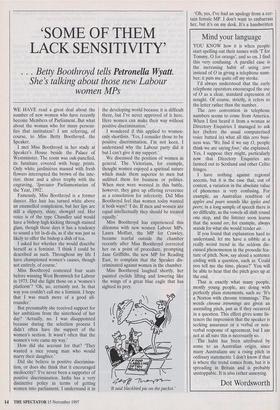Mind your language
YOU KNOW how it is when people start spelling out their names with 'T for Tommy, 0 for orange', and so on. I find this very confusing. A parallel case is the increasing habit of using zero instead of 0 in giving a telephone num- ber; it puts me quite off my stroke.
I'd always understood that the early telephone operators encouraged the use of 0 as a clear, standard expression of nought. Of course, strictly, it refers to the letter rather than the number.
The zero convention in telephone numbers seems to come from America. When I first heard it from a woman at Directory Enquiries I managed to ask her (before the usual computerised voice butted in) what all this zero busi- ness was. 'We find if we say 0, people think we are saying four,' she explained. Yes, I suppose they might, particularly now that Directory Enquiries are farmed out to Scotland and other Celtic fringes.
I have nothing against regional accents, but it is the case that, out of context, a variation in the absolute value of phonemes is very confusing. For example, an Australian rendition of apples and pears sounds like ipples and peers; in a long sample of speech there is no difficulty, as the vowels all shift round one step, and the listener soon learns that the sound eer, for example, always stands for what she would render air.
If you found that explanation hard to understand, let me have a nibble at a really weird trend in the seldom dis- cussed phenomenon in the prosodic fea- ture of pitch. Now, say aloud a sentence ending with a question, such as 'Could you tell me the time, please?' You will be able to hear that the pitch goes up at the end.
That is exactly what many people, mostly young people, are doing with perfectly plain statements, such as: 'It's a Norton with chrome trimmings.' The words chrome trimmings are given an ascending pitch, just as if they occurred in a question. This effect gives some lis- teners the impression that the speaker is seeking assurance or a verbal or non- verbal response of agreement, but I am not at all sure this is necessarily so.
The habit has been attributed by some to an Australian origin, since many Australians use a rising pitch in ordinary statements. I don't know if that is where the trend comes from, but it is spreading in Britain and is probably unstoppable. It is also rather annoying.
Dot Wordsworth










































































 Previous page
Previous page